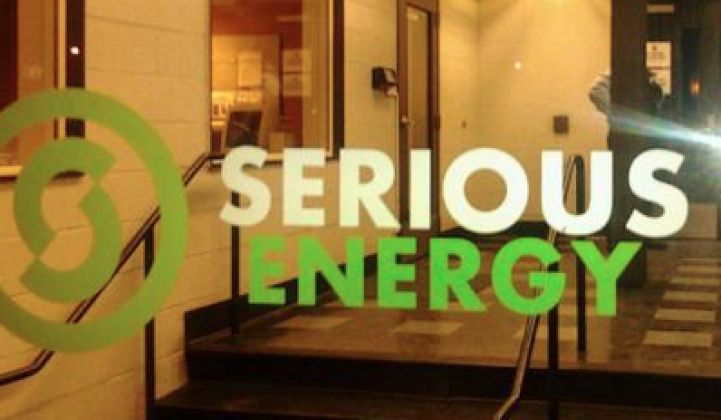Serious Energy, a company that once wanted to do it all in energy efficiency, is now doing comparatively very little.
The long-struggling California-based firm backed by $140 million in venture capital is now a small piece of the company it once was. Or, perhaps more accurately, it's now the company it started out as -- before it raked in millions in venture funds and expanded in many different directions.
Leading HVAC company Trane confirmed that it recently acquired Serious' energy management software platform -- a platform Serious Energy itself acquired in 2010 with the help of millions in venture capital -- for an undisclosed amount. Serious Energy would not comment on any of the details to GTM. (Hat tip to Katie Fehrenbacher for initially reporting on the story.)
GTM reporter Jeff St. John wrote a comprehensive and prescient piece on Serious' troubles in 2012. As the company sought out new rounds of venture capital, it expanded from simply producing soundproof drywall to making a range of green building materials, establishing a financing arm with a goal of leveraging $1 billion for projects, and eventually getting into software development.
As Serious branched out further and then failed to gain traction in its new business units, it lost a range of important staff to competitors and replaced its CEO.
Over the last year, Serious has closed its window factory and shed nearly all its other production assets, except for its soundproof drywall and window film units. It also closed its project financing shop. This was not a surprise, as Serious' leadership explained to GTM's St. John in 2012 that they were spinning off these businesses in order to "focus on our core business."
However, Serious was still banking on the expansion of its software to get deeper into buildings and open up new markets for its materials. That is now out the door as well. (Although it probably says good things about the software that a major company like Trane would be interested in purchasing it.)
As Serious works to regain its footing and focus on a much smaller niche, some are reflecting on the conditions that contributed to the meteoric rise and fall of similar companies.
"Some firms in this space have been burdened with a West Coast mentality," said Jon Guerster, CEO of the Boston-based energy services company Groom Energy. "There's a thinking that if an industry is worth going after, you need to go after it as fast as you can."
For Serious, that meant expanding into new technologies and service offerings quickly in order to directly challenge the traditional efficiency behemoths like Honeywell, Johnson Controls, Schneider Electric and Siemens.
"There was a belief that the world was ready to build systems that were going to completely change how energy is consumed quickly -- that it would be a blow-out market," said Guerster. "That thesis allows you to take big risks."
And like other recent venture-backed fizzles and failures in cleantech, those big risks didn't pay off for Serious Energy. Some onlookers say they have learned from those experiences.
Mike Zimmerman, CEO of BuildingIQ, a California-based startup focused on optimizing HVAC systems with "tuning" software, says he's one.
"We're staying focused on software. We knew we didn't want to expand too dramatically, so we've been pretty conservative about how we've funded the business so we can grow in line with market adoption," he said.
Zimmerman's company has brought in $15 million in venture capital -- including from Siemens and Schneider Electric.
"We took a view that having strategic relationships in the industry was going to be very valuable, which enabled us to come up with mix of strategic and financial relationships. We realized in this market that distribution and cooperation with incumbents is really key," said Zimmerman.
Of course, BuildingIQ is still at the edges of a software market yet to break open in a big way. Having the opposite strategy of a floundering company doesn't make it a successful one.
But the targeted, more conservative approach is one that a lot of entrepreneurs, startups and financiers taking as the "next wave" of cleantech investment unfolds. (Shameless plug: we've got an upcoming conference on cleantech market reinvention that will focus on exactly these types of experiences.)
"It's interesting to see how thinking evolved in this sector when you timestamp it," said Groom's Guerster.
For more background on Serious' issues, read Jeff St. John's earlier article here.



